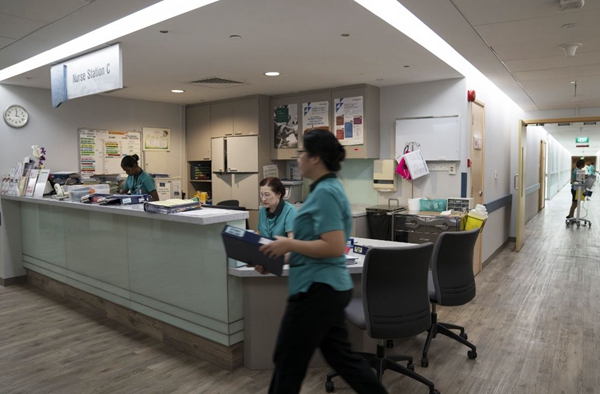Raffles Medical Group to open hospital in Shanghai next year

Nurses at a work station of
the Raffles Hospital in Singapore. [Photo/Agencies]
Raffles Medical Group from Singapore has announced that its Shanghai branch, a Sino-foreign joint venture, will open in the first quarter of next year, the latest signal that foreign investment in the local medical care system is gathering pace.
The tertiary hospital with 400 beds in the China (Shanghai) Pilot Free Trade Zone in Pudong New District will be the first large-scale general hospital in the city with Singaporean investment, Loo Choon Yong, executive chairman of Raffles Medical Group, said in an exclusive interview with China Daily on Thursday.
"The Shanghai hospital is a major step toward Raffles' goal of providing international tertiary level medical services to locals and expatriates living in the eastern metropolis and surrounding provinces as well as international patients from the neighboring countries," said Loo.
Before Shanghai, the group, which has a 43-year history and initiated its flagship hospital in Singapore in 2001, opened a 700-bed general hospital in Chongqing in January, the first hospital fully owned by foreign funds in the southwestern Chinese municipality, he said.
The hospital will begin with various departments, including cardiology, obstetrics, oncology, orthopedics and pediatrics, with about 200 medical staff with half from abroad and half from the local community, he said.
Since mid-2014, more than 20 hospitals partnering with foreign medical institutions or wholly foreign-funded facilities have been awaiting approvals to enter Shanghai to gain a share of the Chinese medical care market, a report by China National Radio said. There were more than 200 Sino-foreign joint venture medical institutions on the Chinese mainland by 2013, official data showed.
In Shanghai, where the first such joint venture appeared in 1989, the speed of foreign investment in the field has accelerated in recent years, especially after the Shanghai FTZ measures began to allow the establishment of wholly foreign-invested medical institutions in 2013, then eliminated the minimum investment amount and the limit of operating years in the following year.
In 2016, Japanese-funded Shanghai Towako Hospital began operation in the Shanghai FTZ and Jiahui Health, the first Sino-foreign joint venture tertiary hospital, began to treat patients in the same year. Pudong district government said in 2018 that there will be at least eight Sino-foreign joint venture or wholly foreign-funded hospitals in the district by 2020.
Shanghai aims to build itself into a medical center in Asia and its international medical parks close to Hongqiao International Airport and Pudong's Lingang area have been undergoing progress these past few years, said Yan Dongfang, executive vice-president of the Shanghai Association for Nongovernment Medical Institutions.
"By integrating high-quality domestic and international medical resources, Shanghai has formed a prototype of international-standard modern medical service industry, and the space for future growth is huge," he said.
Loo said that the top 20 percent of the 24 million Shanghai residents can more than afford to pay for treatment at the hospital, and many of them now have commercial insurance.
Shanghai's advantage also lies in its function as a core city in the affluent Yangtze River Delta region and that a rising number of its younger generation who once studied or lived abroad would like to have the kind of healthcare services that they experienced overseas, Loo said.
"As more such hospitals with foreign investment compete in the market, local Chinese residents and expats will get better and more affordable care at the end of the day. It'll also allow the local health authority to take advice from different perspectives and improve its own system," he said.
 Contact Us
Contact Us

 Pudong lights up city with spectacular shows and cultural marvels
Pudong lights up city with spectacular shows and cultural marvels Brilliant light show to illuminate Huangpu River
Brilliant light show to illuminate Huangpu River Maple leaves paint splendid scenery in Pudong
Maple leaves paint splendid scenery in Pudong Appreciate alluring lotus blossoms in Pudong's Century Park
Appreciate alluring lotus blossoms in Pudong's Century Park


